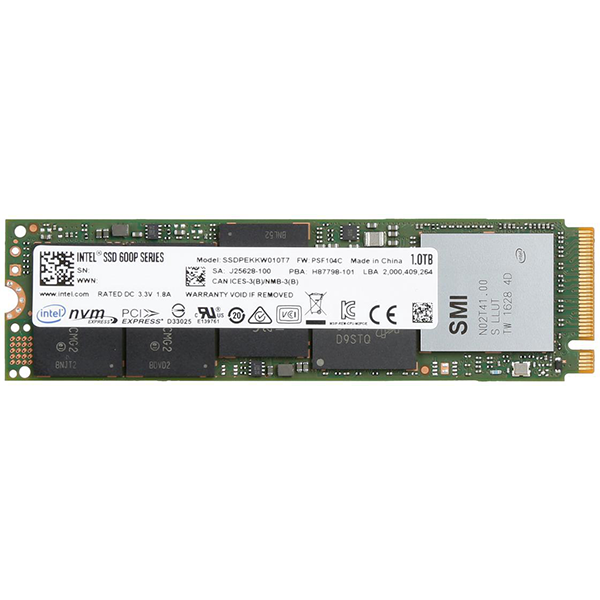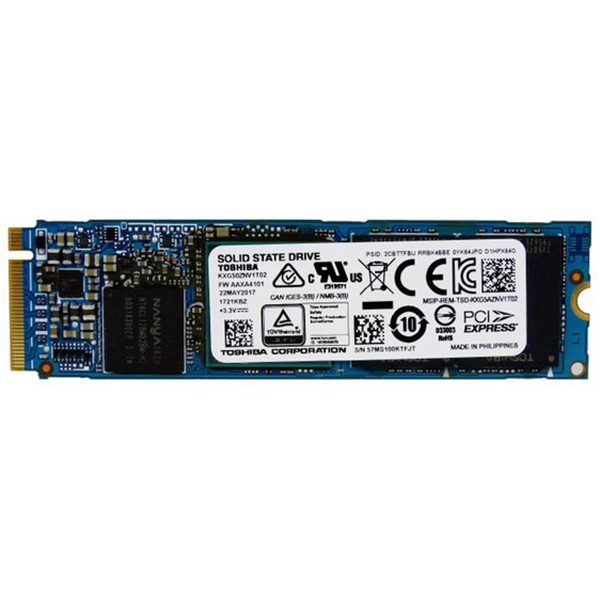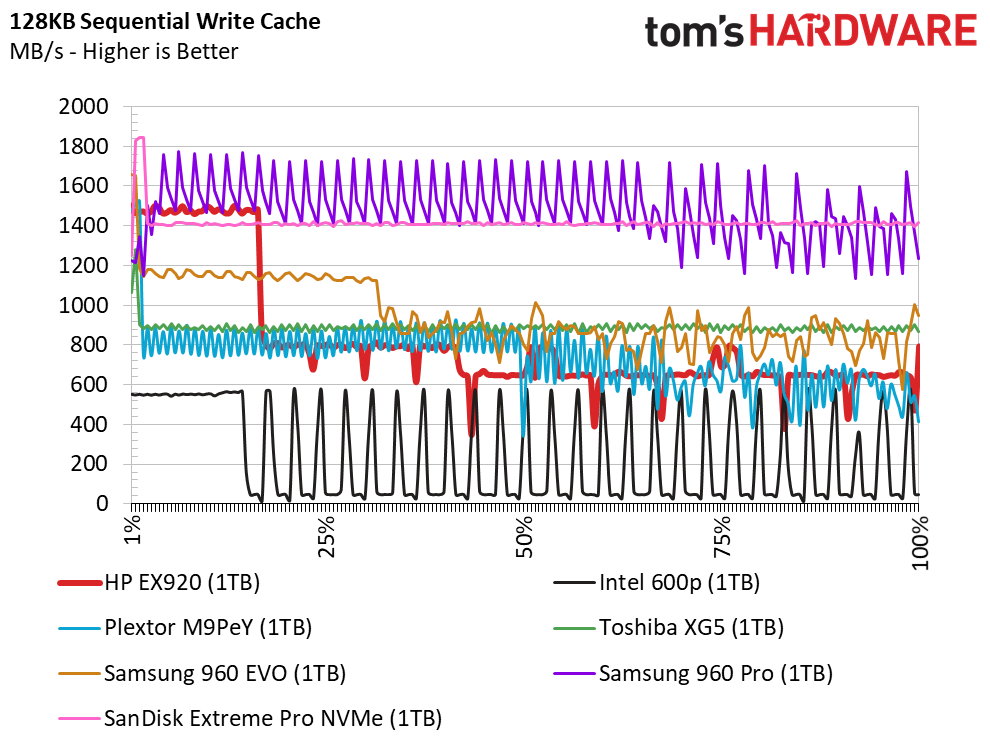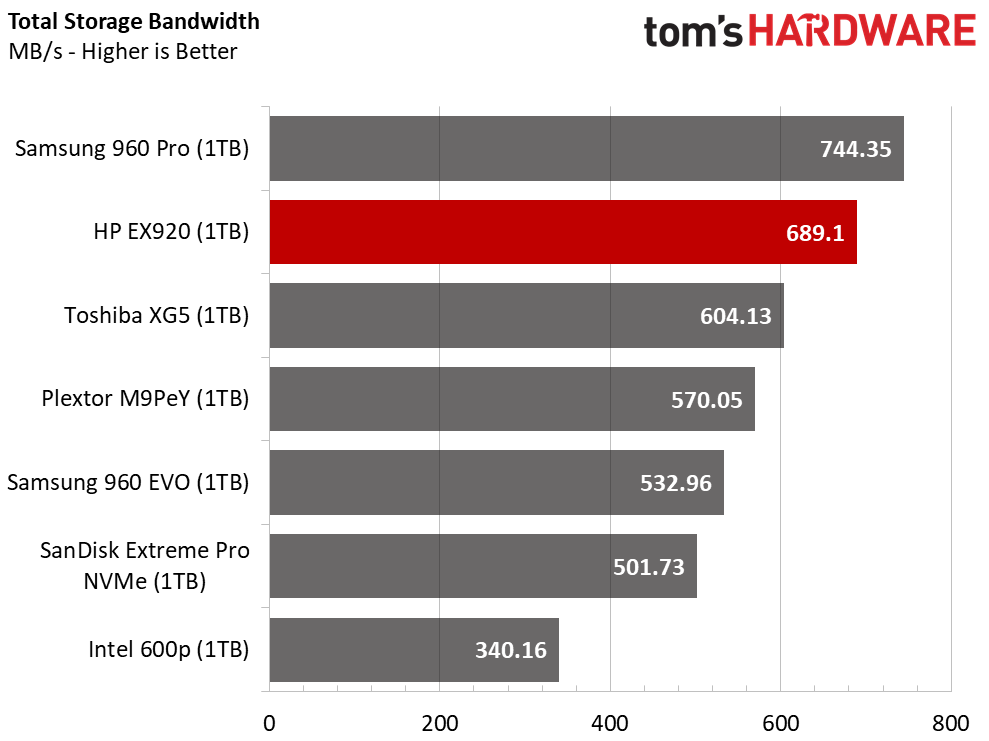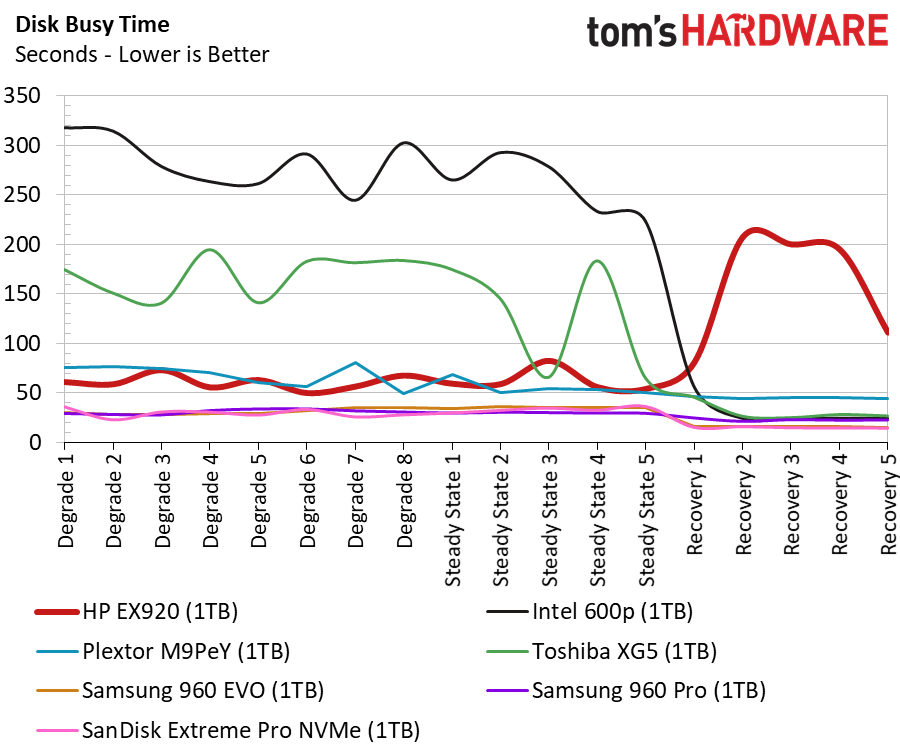HP EX920 SSD Review: Affordable And Fast Mainstream NVMe
Why you can trust Tom's Hardware
1TB Performance Testing
Comparison Products
Intel has yet to release the 1TB 760p, and our Adata SX8200 hasn't arrived yet. Those two drives feature the same IMFT 64-layer flash and SM2262 controller as the HP EX920. We expect these three SSDs to dominate the low-cost NVMe market all summer, but other similar SSDs will show up before you put the tanning lotion away. Older favorites are still available, like the Samsung 960 EVO and newer 64-layer models like the Plextor M9Pe.
We've also included the Intel 600p and the new SanDisk Extreme Pro NVMe that has the same 64-layer flash as the Toshiba XG5 OEM NVMe SSD.
Sequential Read Performance
To read about our storage tests in-depth, please check out How We Test HDDs And SSDs. We cover four-corner testing on page six of our How We Test guide.
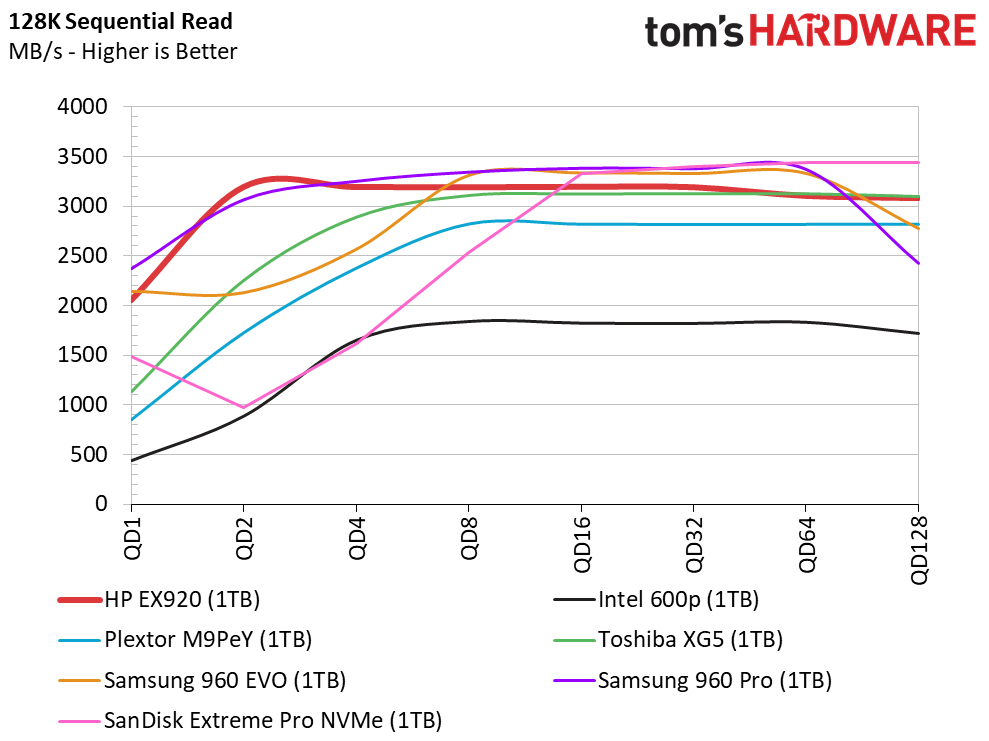
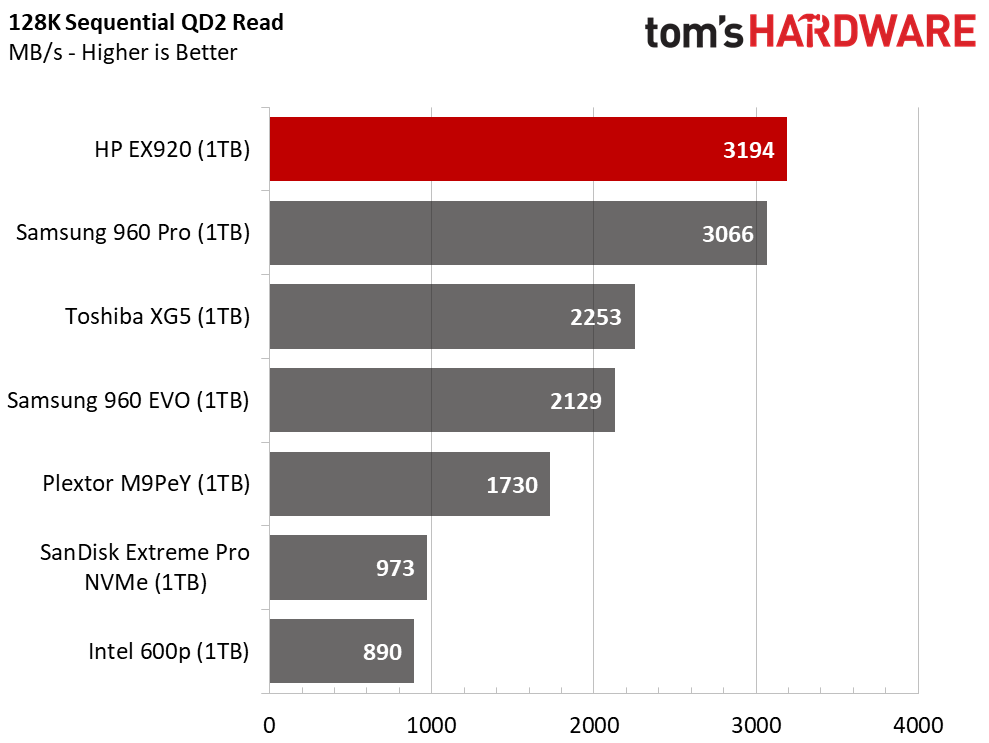
The 1TB HP SX920 has strong sequential read performance at low queue depths. At QD1, only the iconic Samsung 960 Pro 1TB ($608.99 at Newegg) performs better, but the EX920 delivers more performance at QD2.
Sequential Write Performance
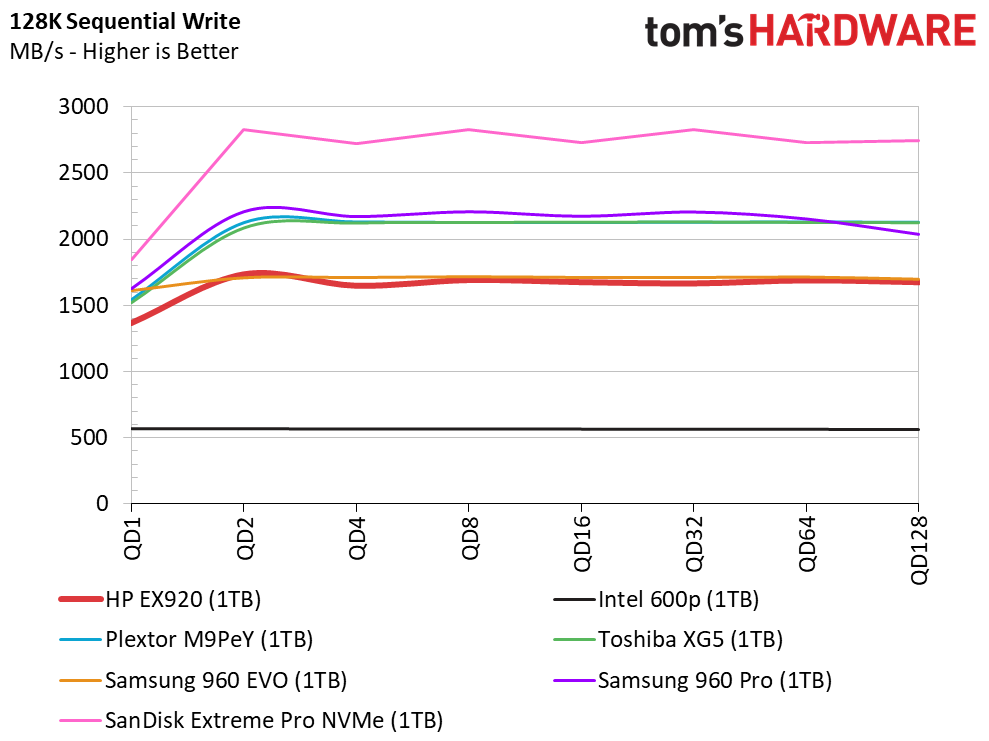
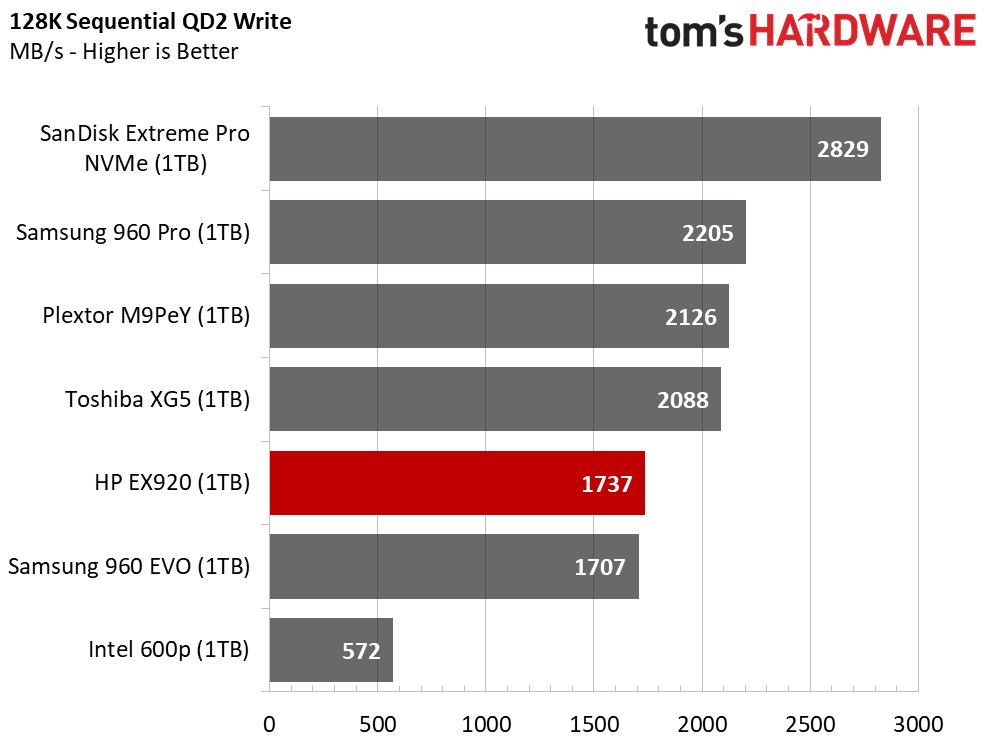
The EX920 delivers just over 1,300 MB/s sequential write speed at QD1, which scales to 1,700 MB/s at QD2. It's difficult to complain about the performance here: it's nearly impossible to use these drives fully with normal desktop workloads. In contrast, the 600p falls well below the usable performance barrier.
In the past, we would display an HD Tune Pro screenshot to show the native TLC performance drop after the initial SLC buffer is full, but our new line chart allows us to compare different products.
The 1TB HP EX920 features a hefty SLC cache that absorbs roughly 200GB of sequential data before the workload spills over to the slower TLC flash. For comparison, the new SanDisk Extreme Pro 3D NVMe SSD soaks up around 20GB of data in the SLC buffer before it writes to TLC.
Get Tom's Hardware's best news and in-depth reviews, straight to your inbox.
Random Read Performance
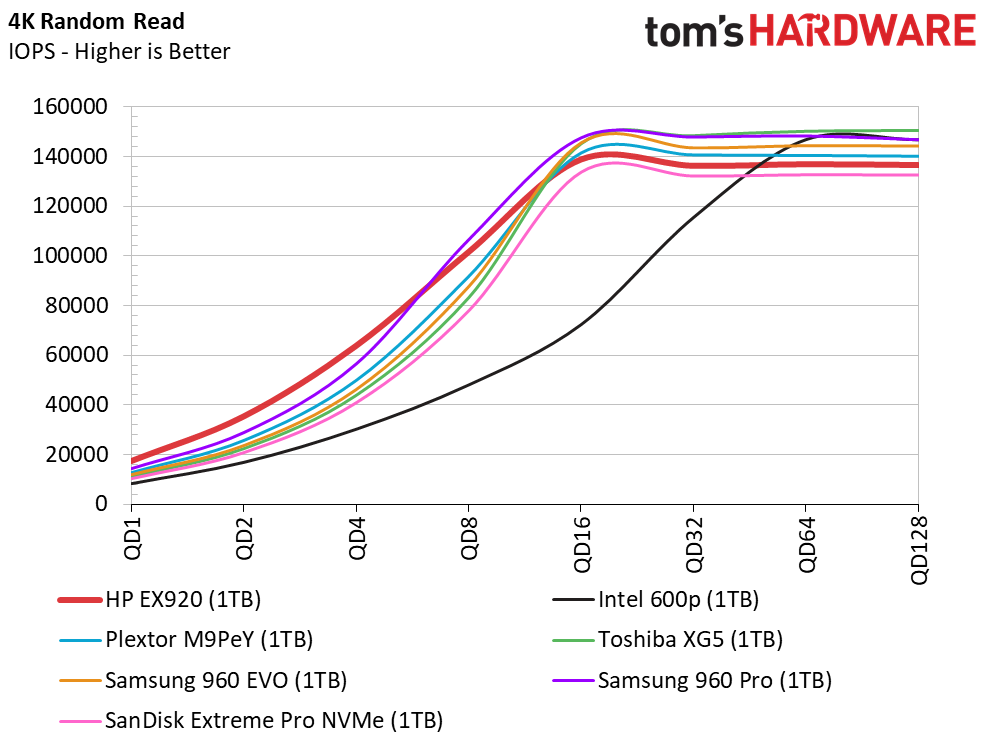
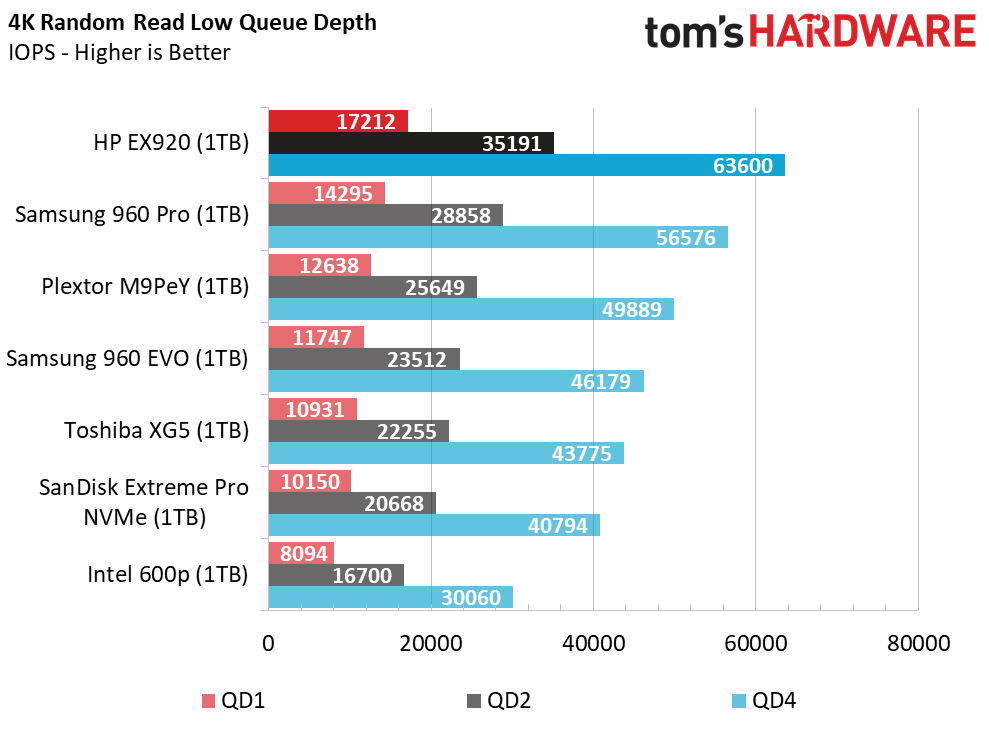
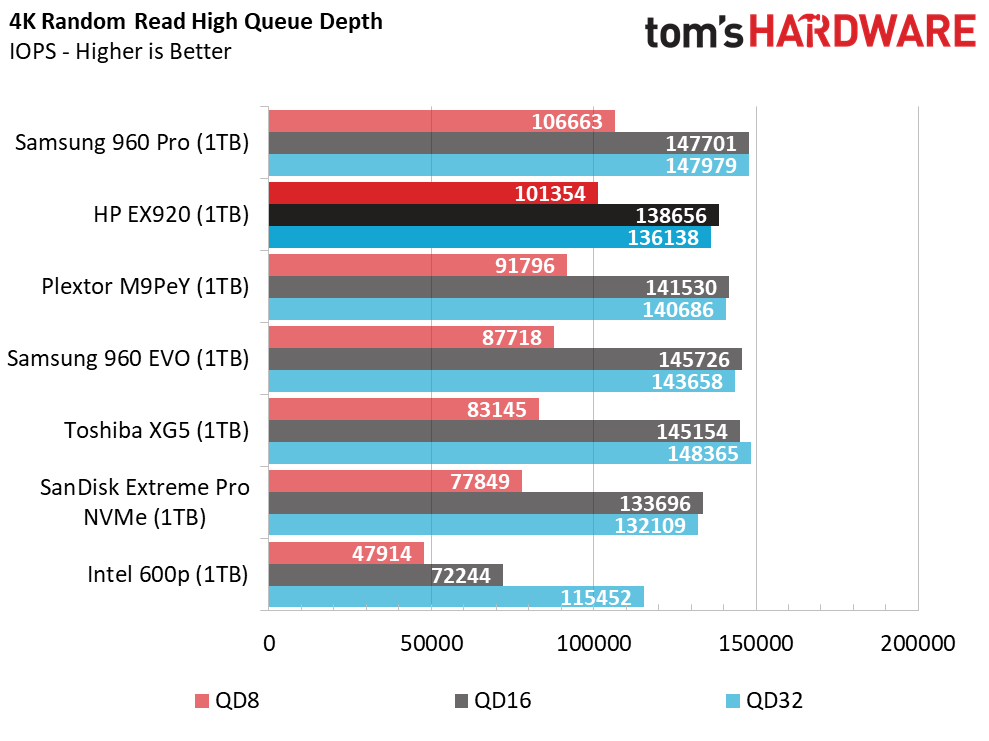
When it comes to flash, it's difficult to beat Micron's 64-layer TLC in random read workloads. The MX500 dominates the SATA category, and now the HP EX920 tops our low queue depth NVMe charts. The HP EX920 has the potential to be a very good consumer SSD, and its low price could make this a product we talk about for years to come.
Random Write Performance
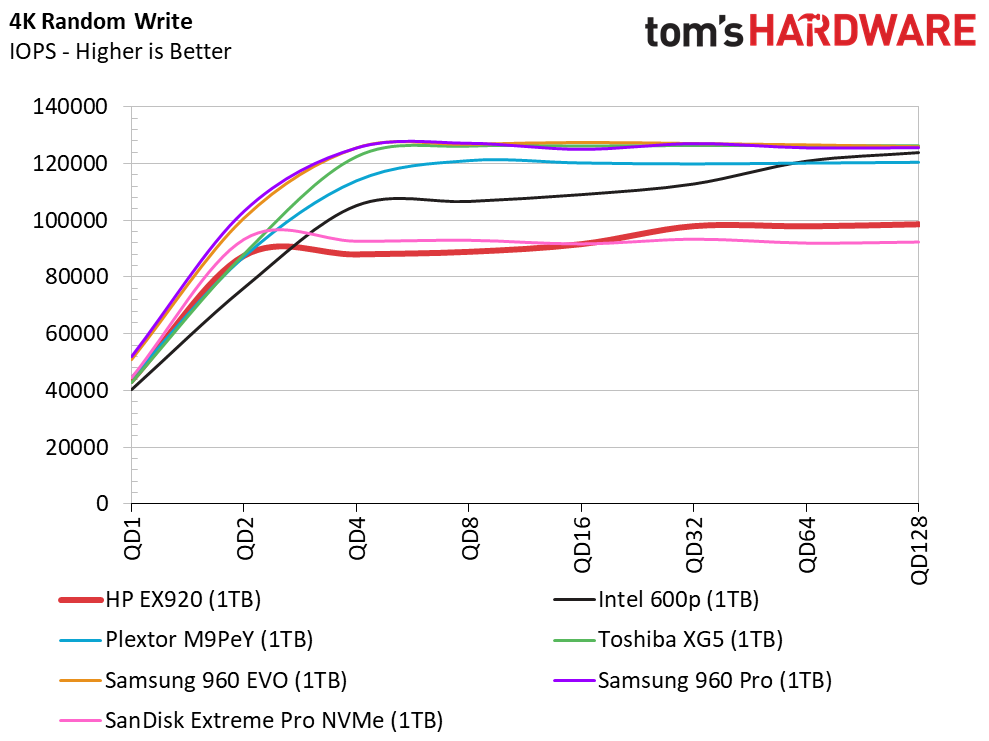
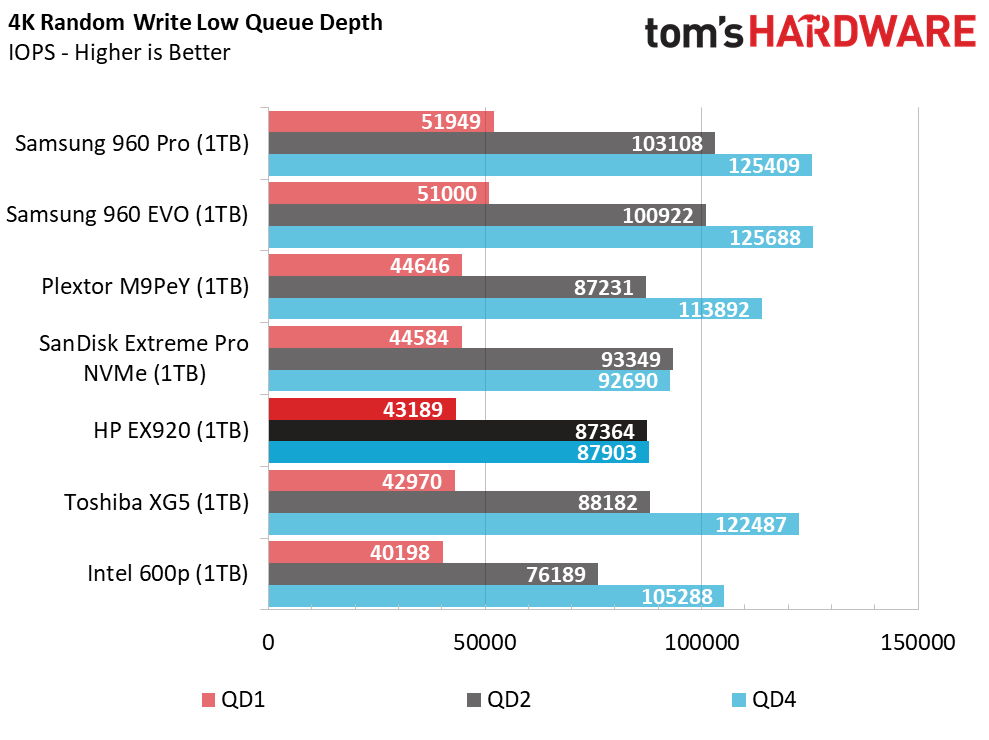
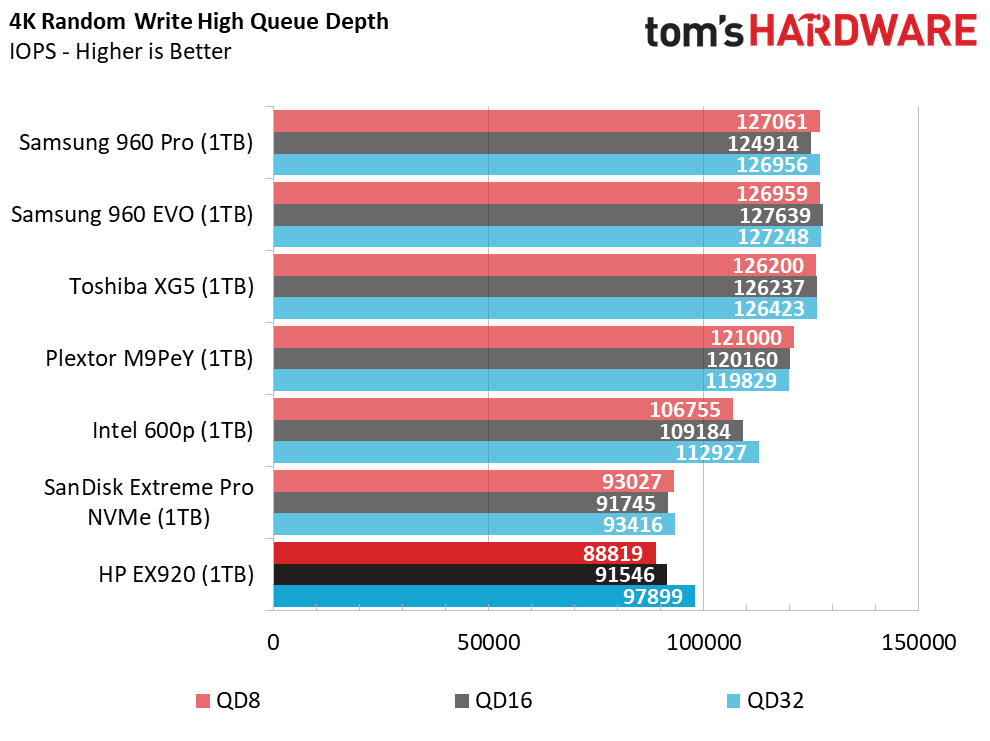
That doesn't mean the EX920 is a perfect SSD. There are some rough edges when you dive into random write workloads. The low-QD random write performance is on par with other popular products on the market, but it trails when we ramp up the workload.
70% Mixed Sequential Workload
We describe our mixed workload testing in detail here and describe our steady state tests here.
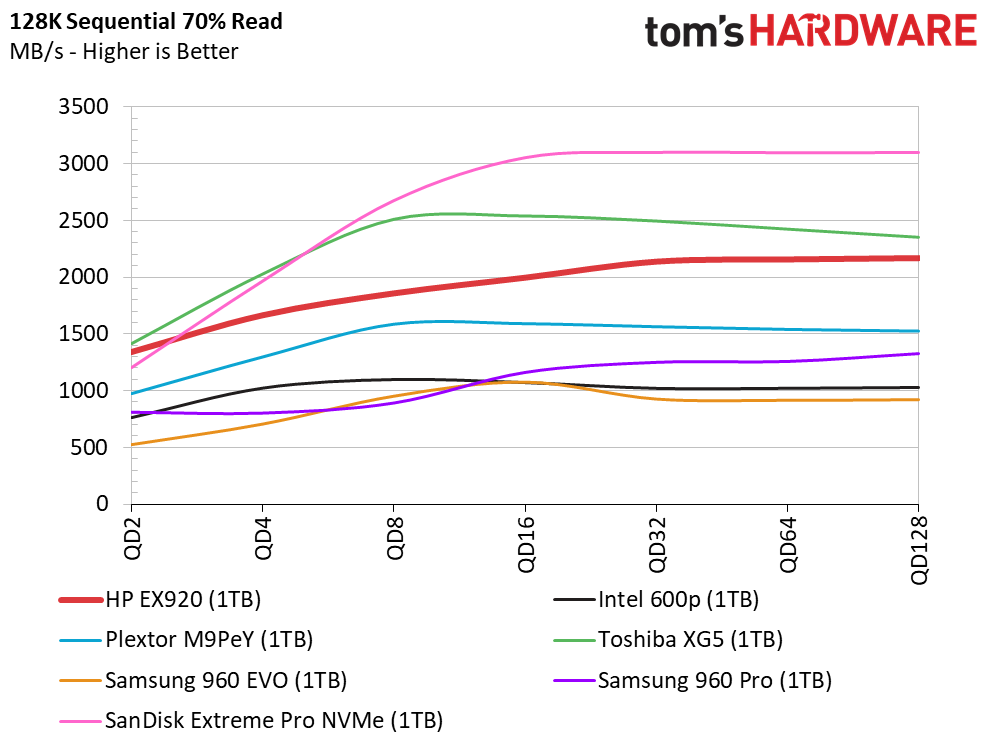
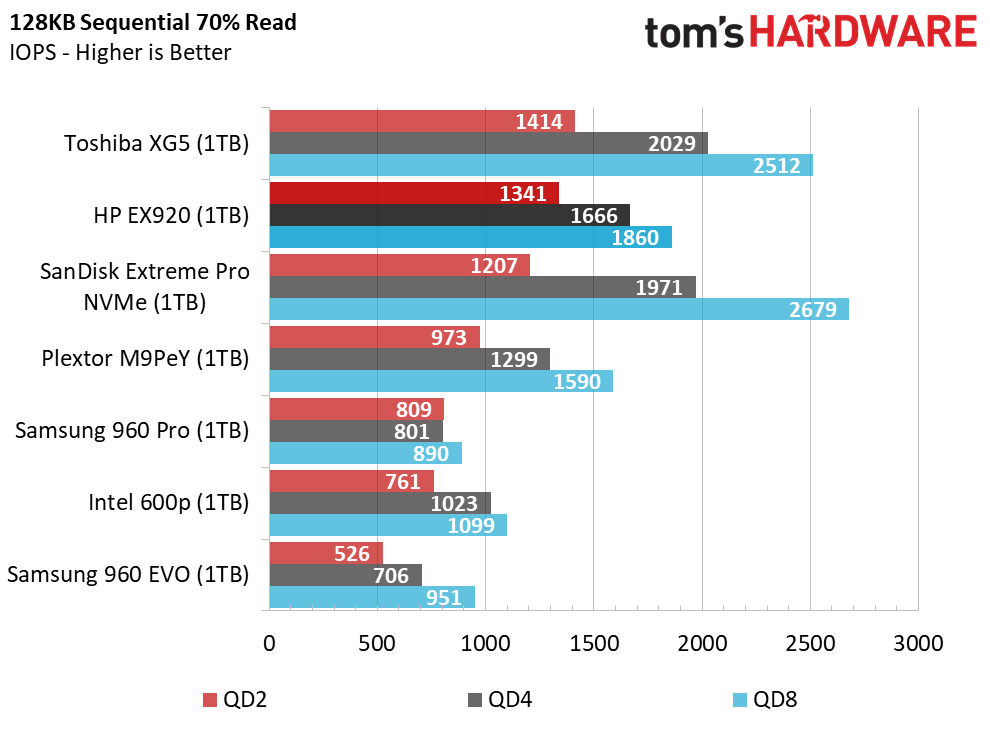
The high sequential read performance propels the EX920 near the top of our mixed sequential charts. The SanDisk Extreme Pro NVMe and Toshiba XG5 perform slightly better with Toshiba's 64-layer Toggle flash. The important take away is that the EX920's performance slots between the Samsung SSDs that became the benchmark for the NVMe SSD market.
70% Mixed Random Workload
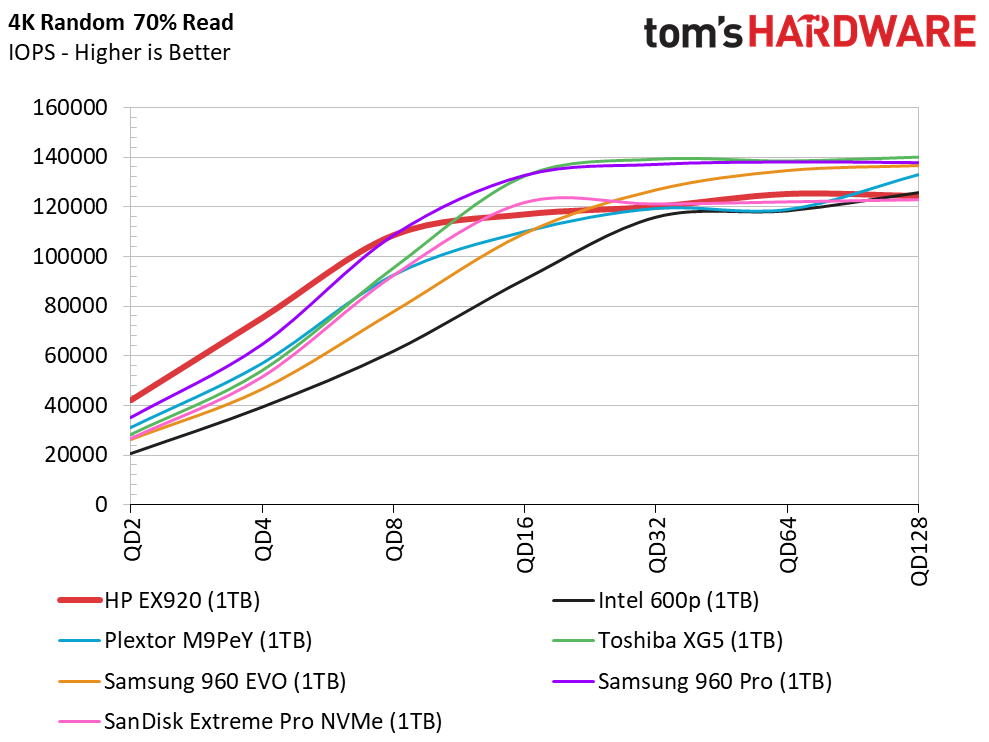
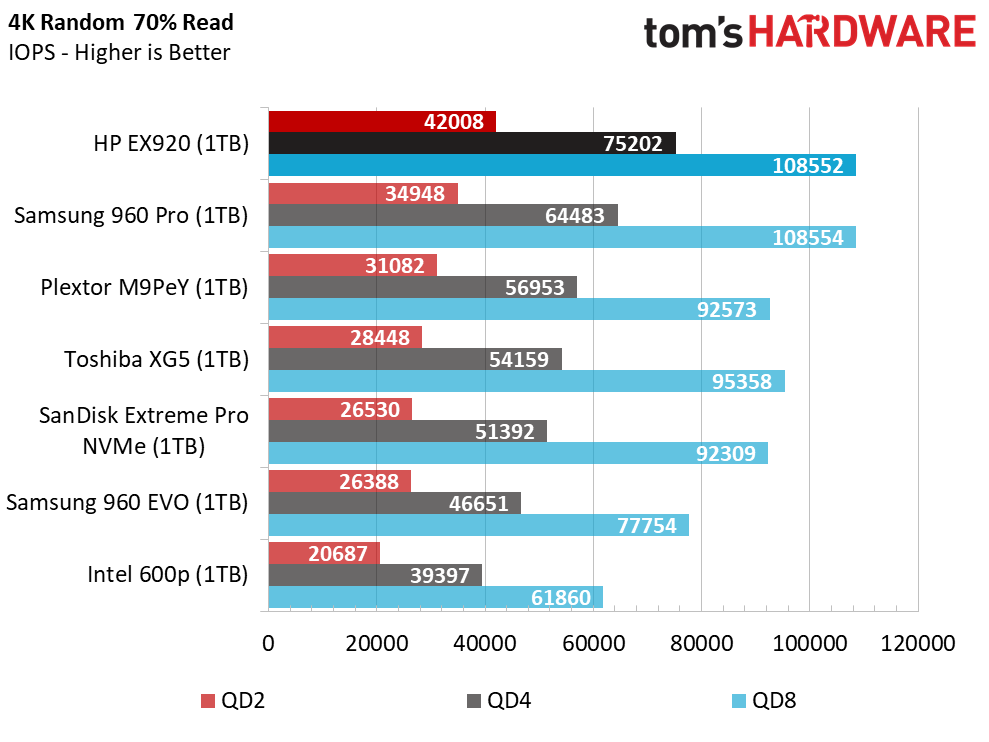
The strong random read performance also allows the EX920 to rise to the top of the random mixed workload chart at usable queue depths (QD2-QD4). The low-cost NVMe drive punches well above its weight class during normal desktop workloads.
Sequential Steady-State
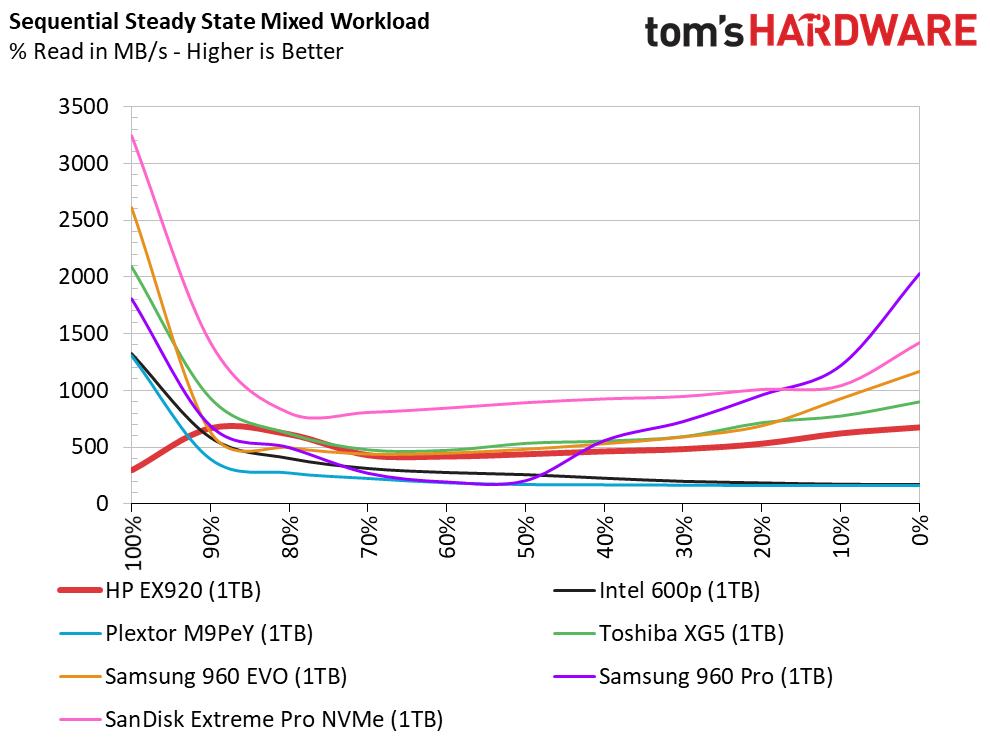
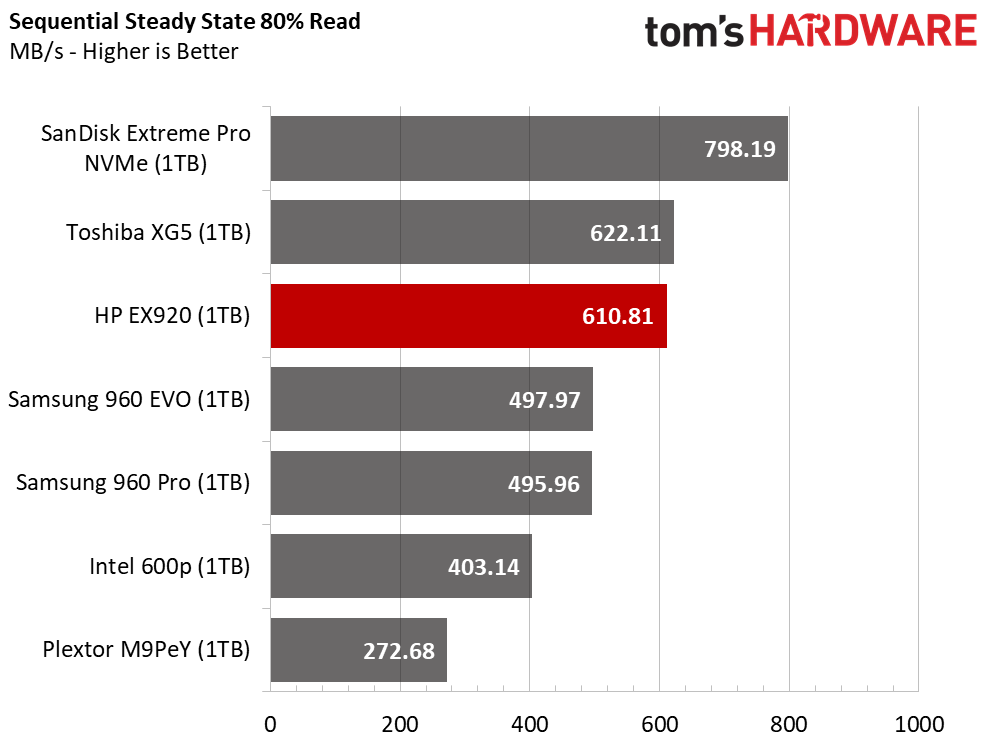
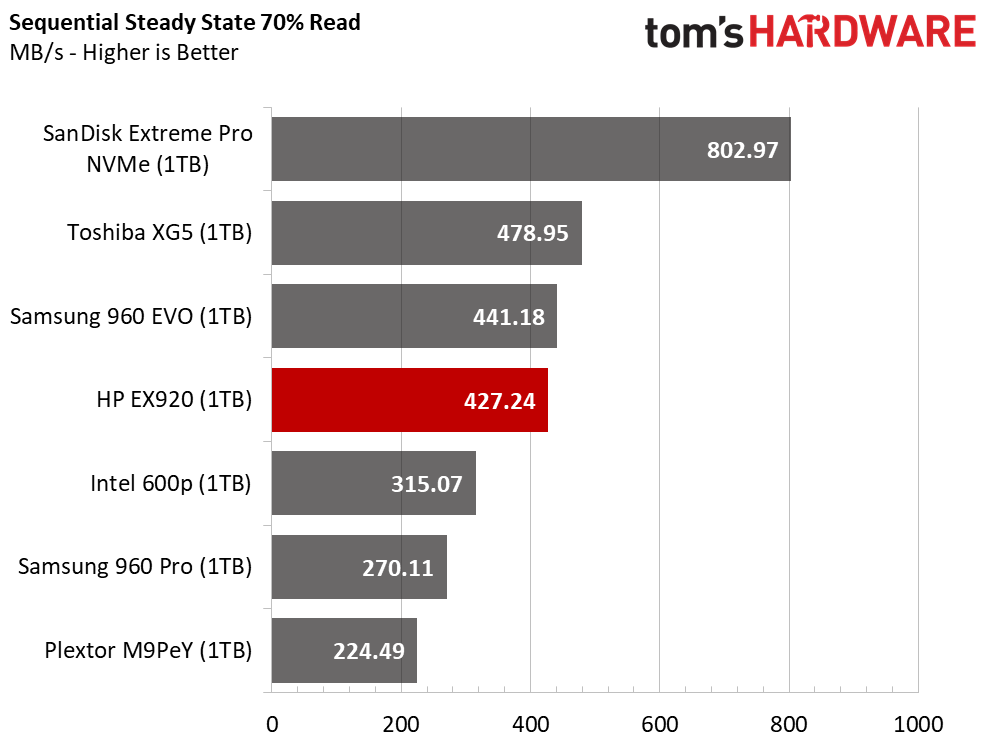
As we hinted to earlier in the review, the EX920 has a few firmware issues. The EX920 will aggressively run background activities after a heavy workload, even when it's still in use. Most SSDs will wait for the SSDs to idle before they start cleanup operations.
The sequential steady-state test shows 100% read to 100% writes on the ends of the chart. Mixed workloads are in the middle. The EX920 lags the field during the random read tests, which will show up later in the review during the heavy workload tests.
Random Steady-State
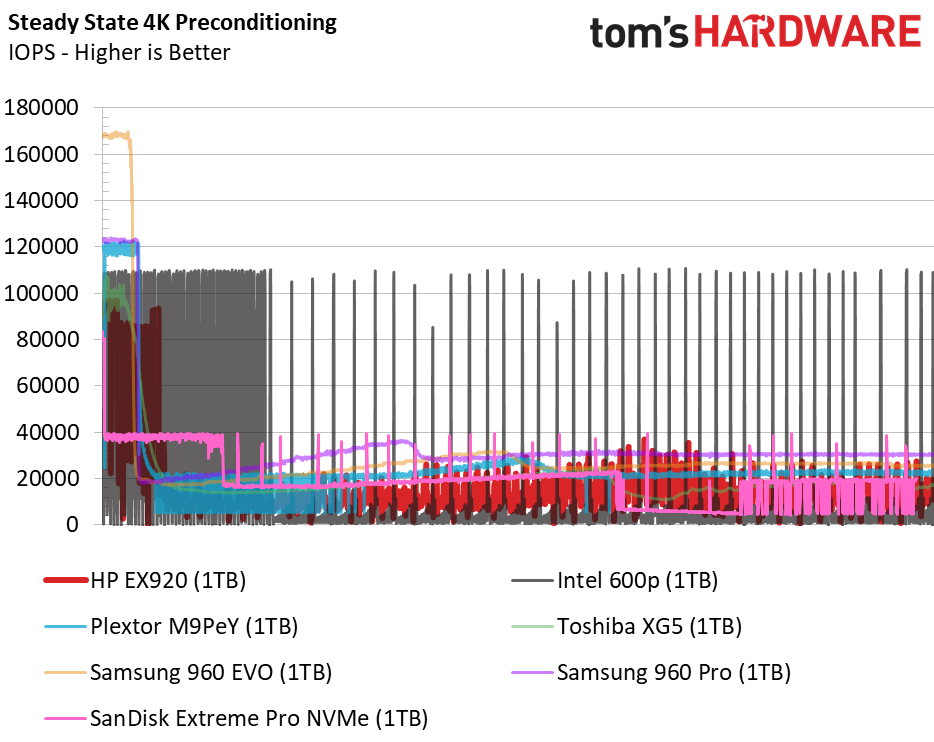
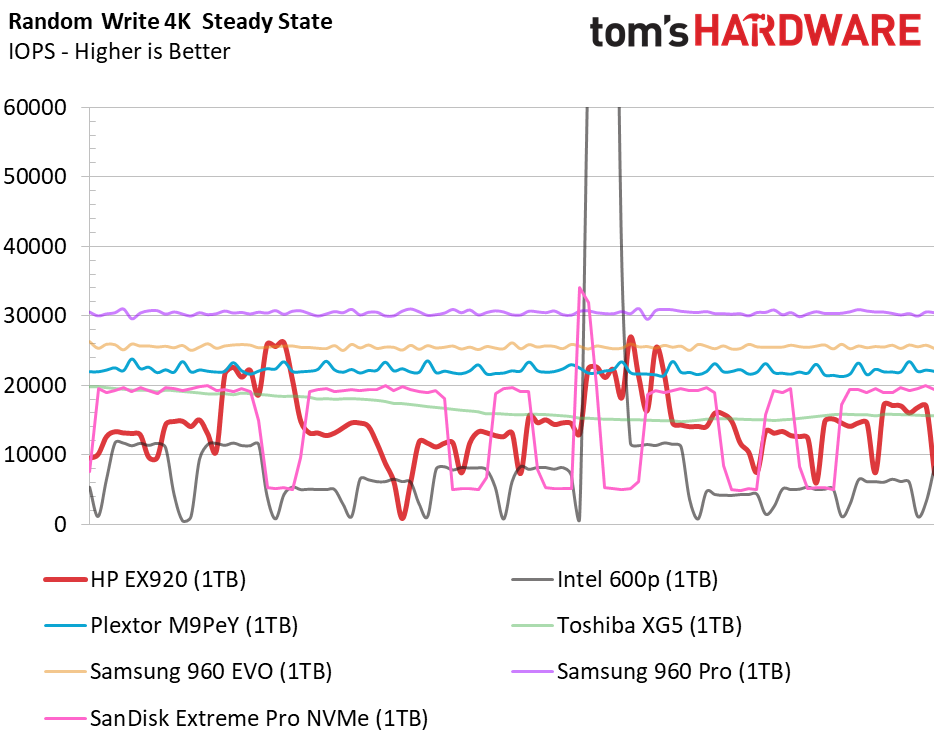
The 1TB EX920 doesn't deliver the same consistent performance we see from some of the newer products. The SLC buffer increases burst performance, but it also wrecks extended workload performance when you need consistency. HP doesn't advertise the EX920 as a workstation or server product, and the two steady-state tests are less important for products designed exclusively for general computing use.
PCMark 8 Real-World Software Performance
For details on our real-world software performance testing, please click here.
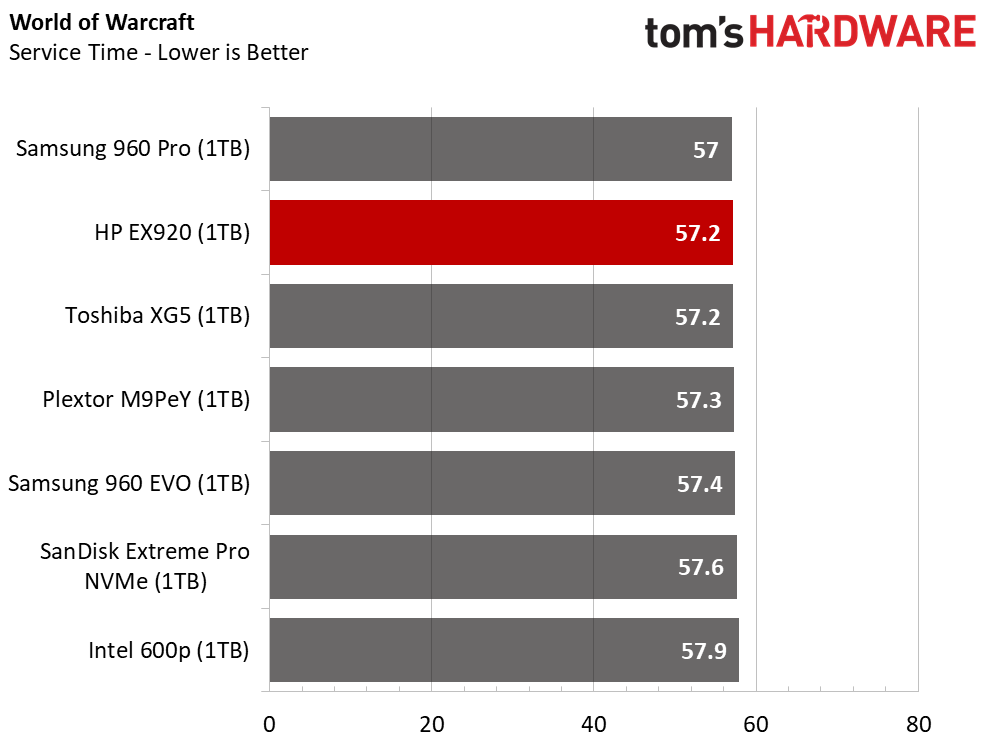
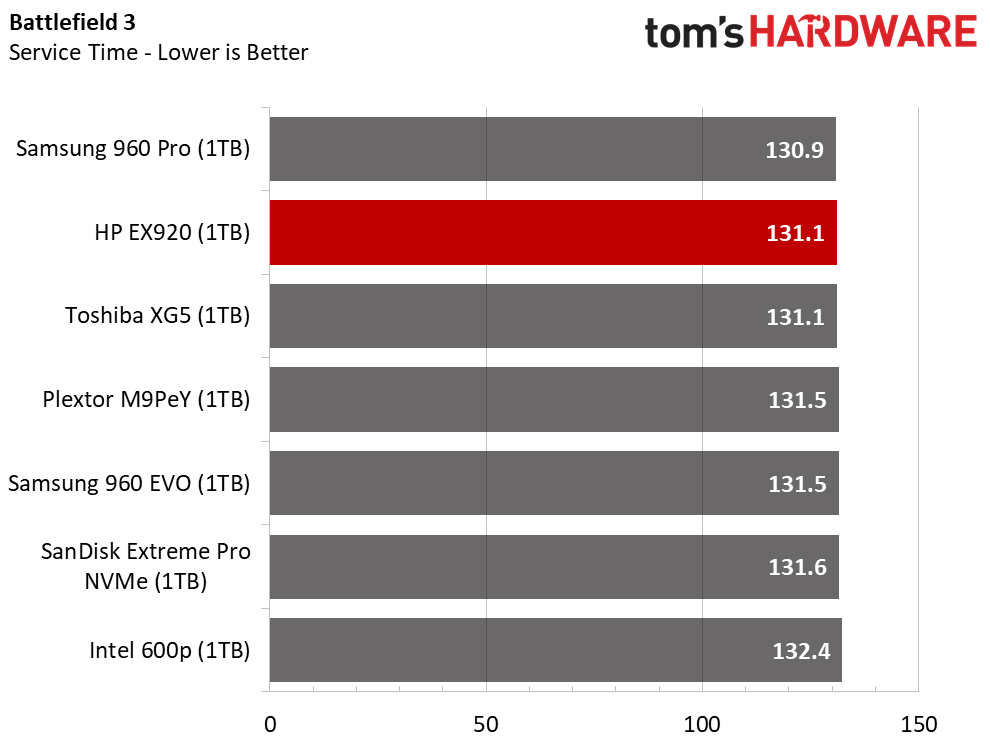
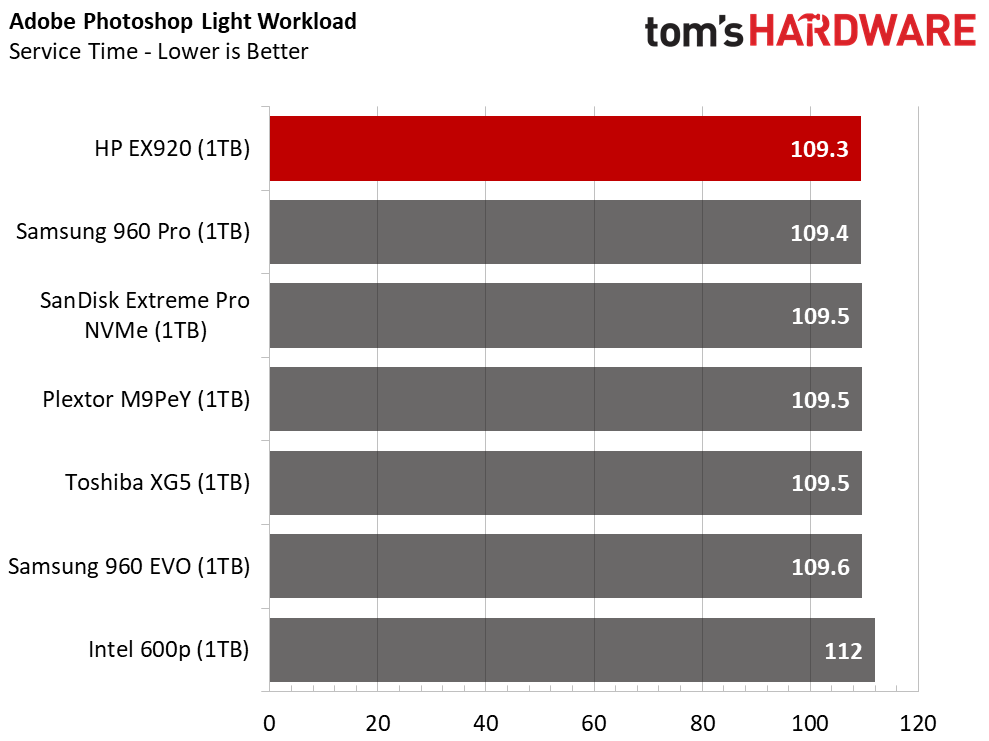
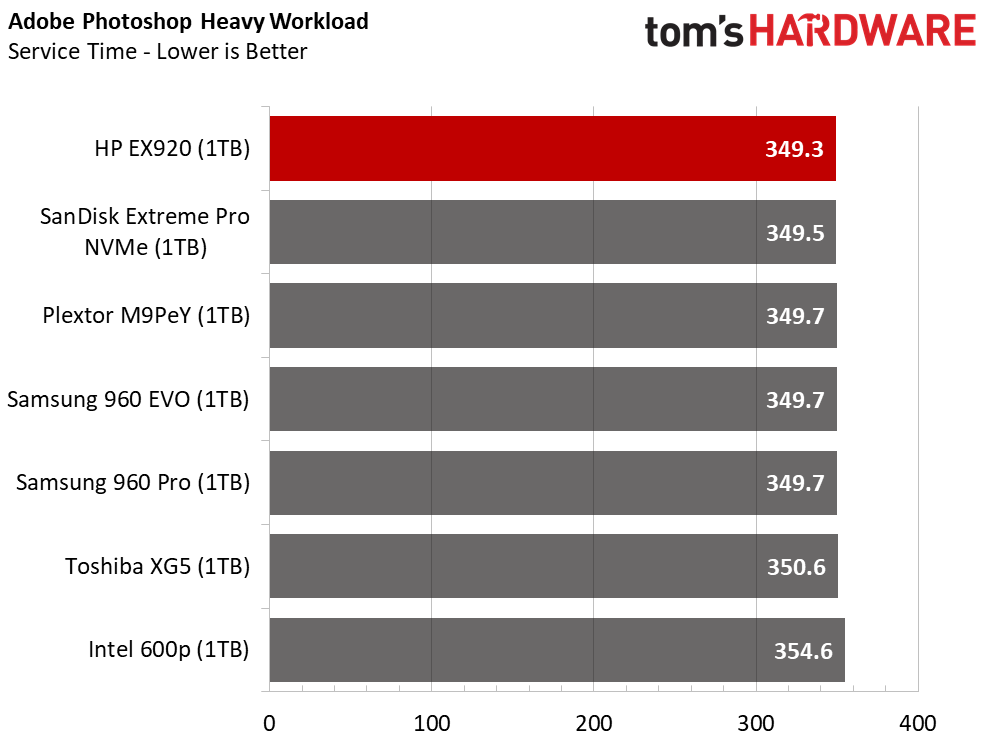
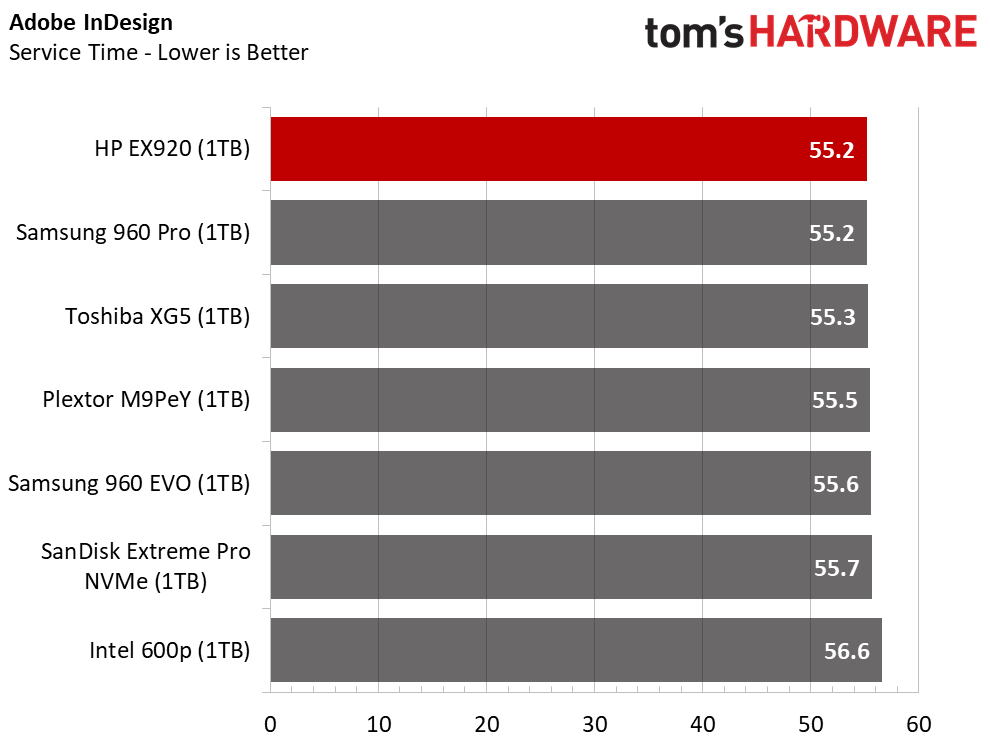
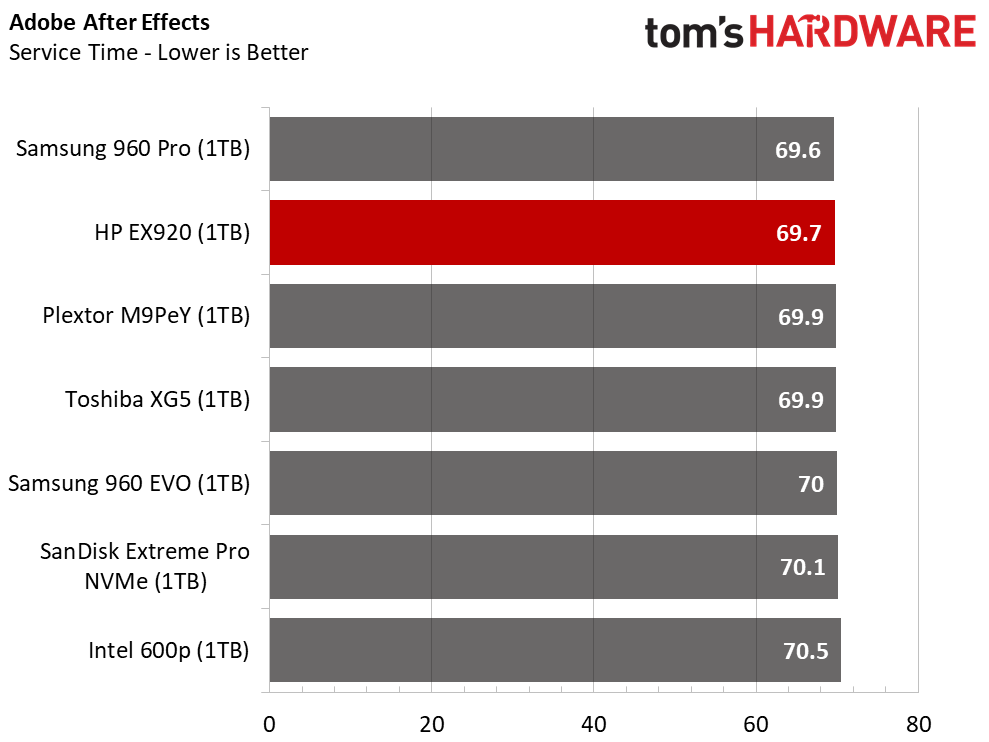
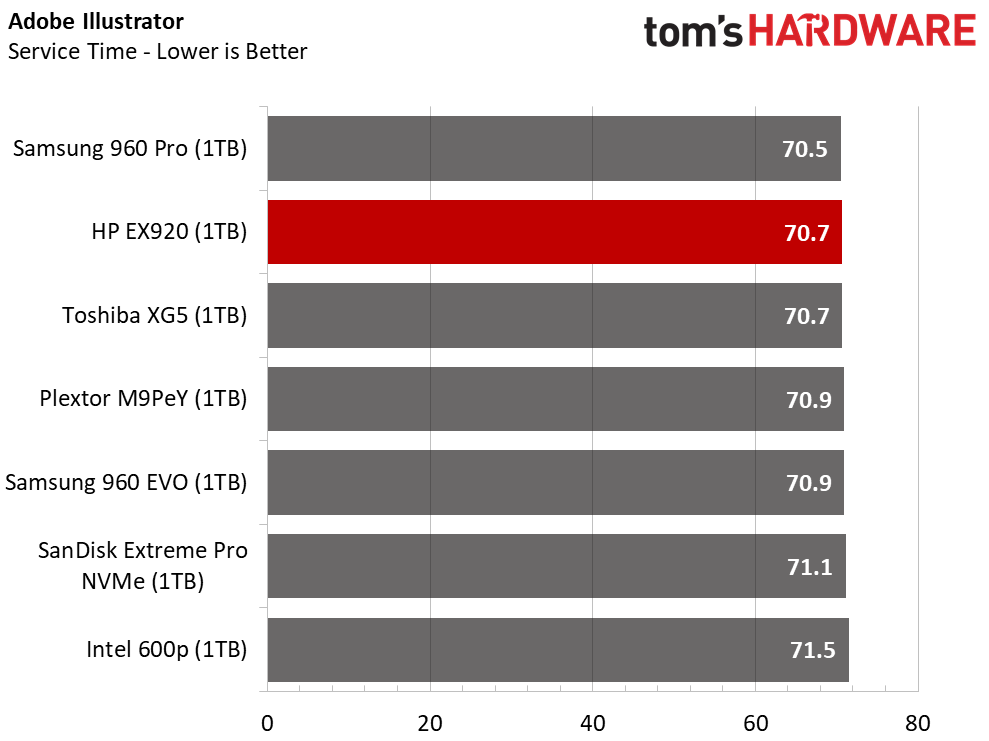
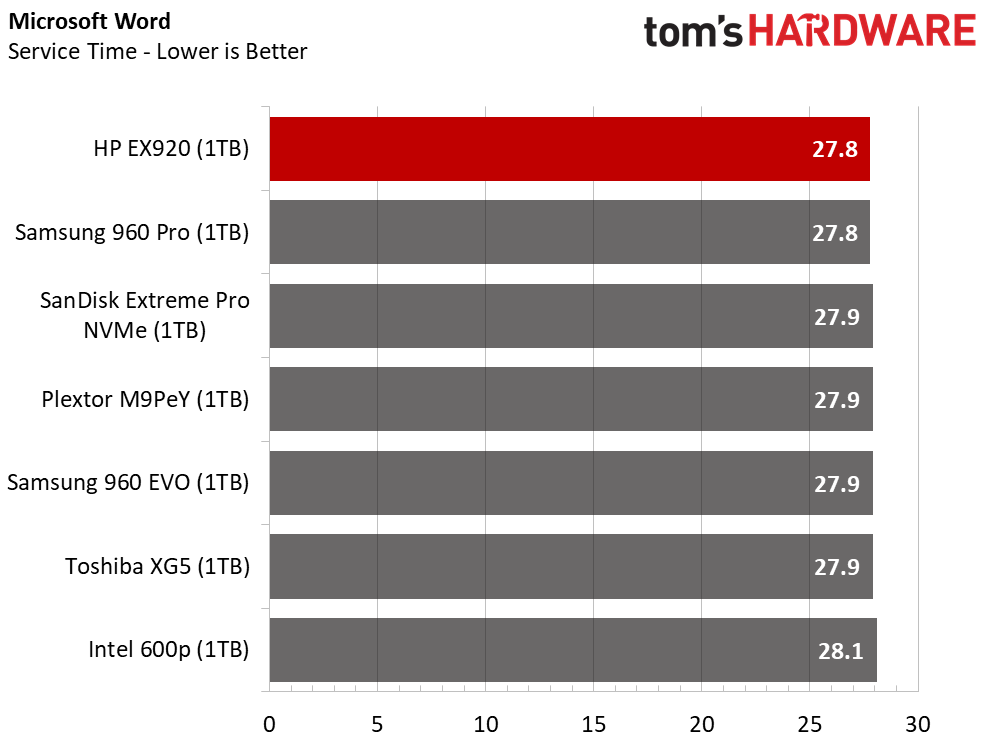
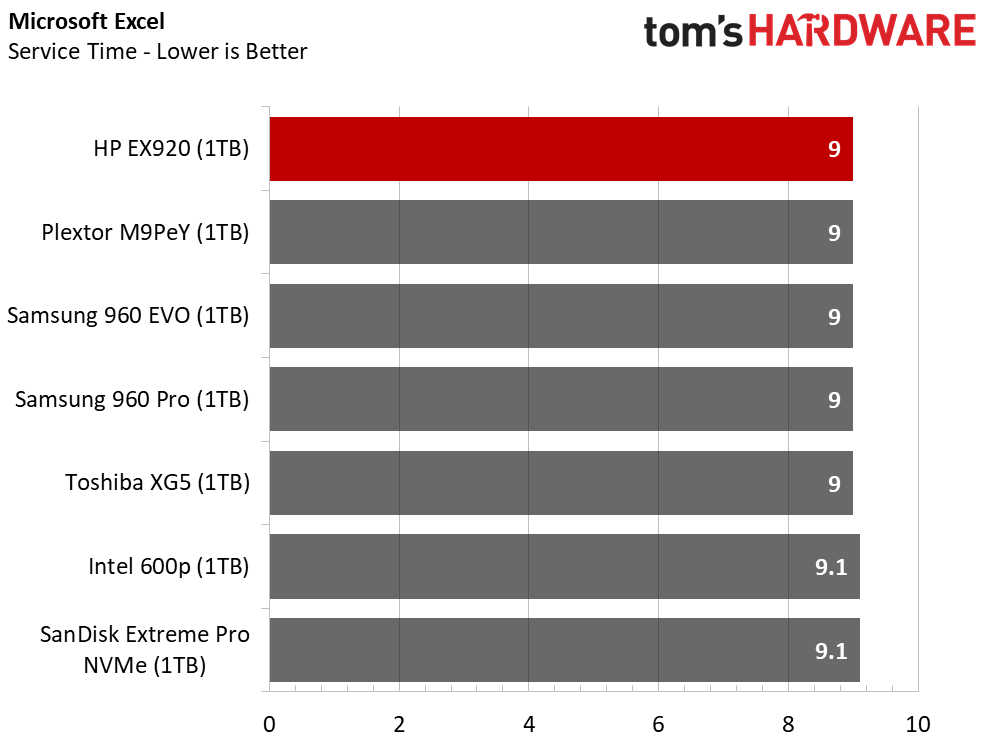
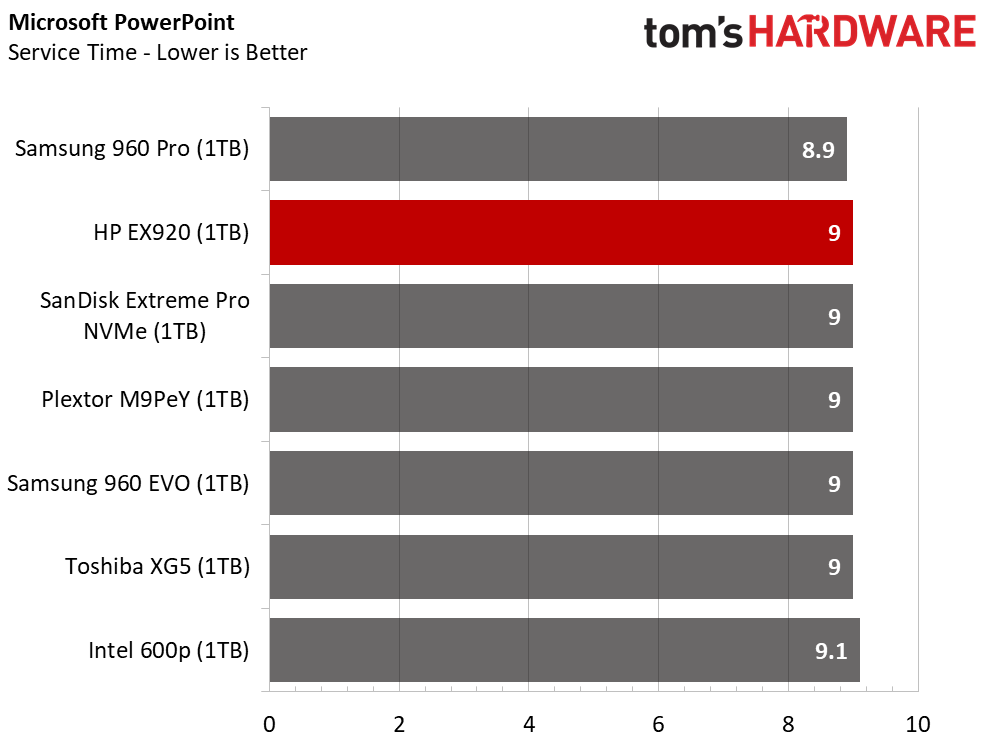
The EX920 1TB performs flawlessly during desktop-class workloads. This $369.99 SSD is right on the heels of the $608.99 1TB Samsung 960 Pro.
Application Storage Bandwidth
The EX920's storage bandwidth is close to the 960 Pro. For several years, most products couldn't even surpass Samsung's EVO series models, but 64-layer memory changes that. The 1TB EX920 also costs significantly less than the 1TB 960 EVO.
PCMark 8 Advanced Workload Performance
To learn how we test advanced workload performance, please click here.
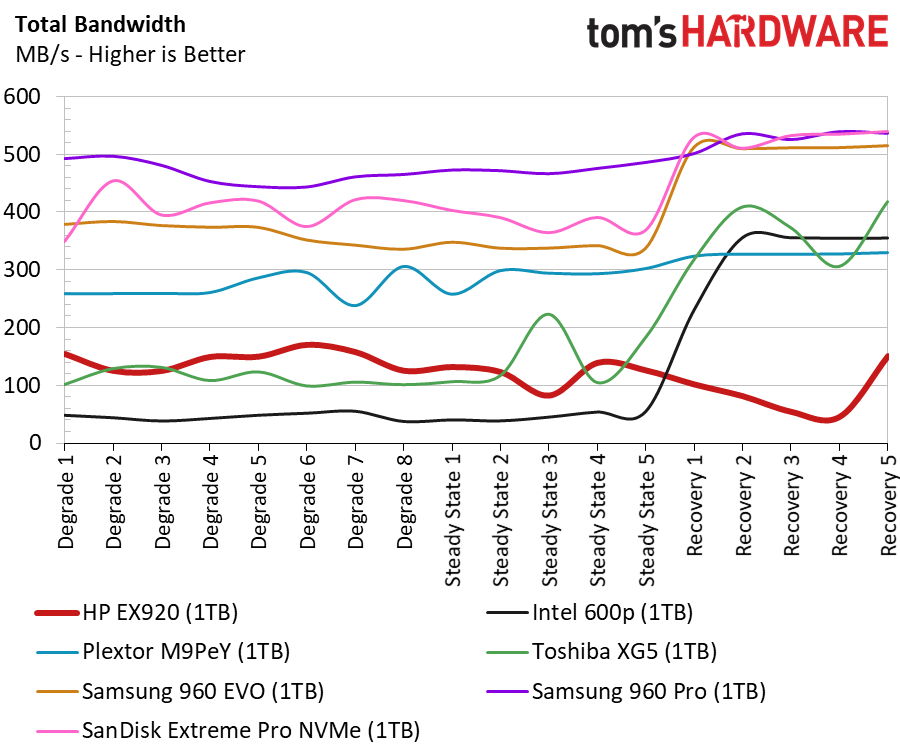
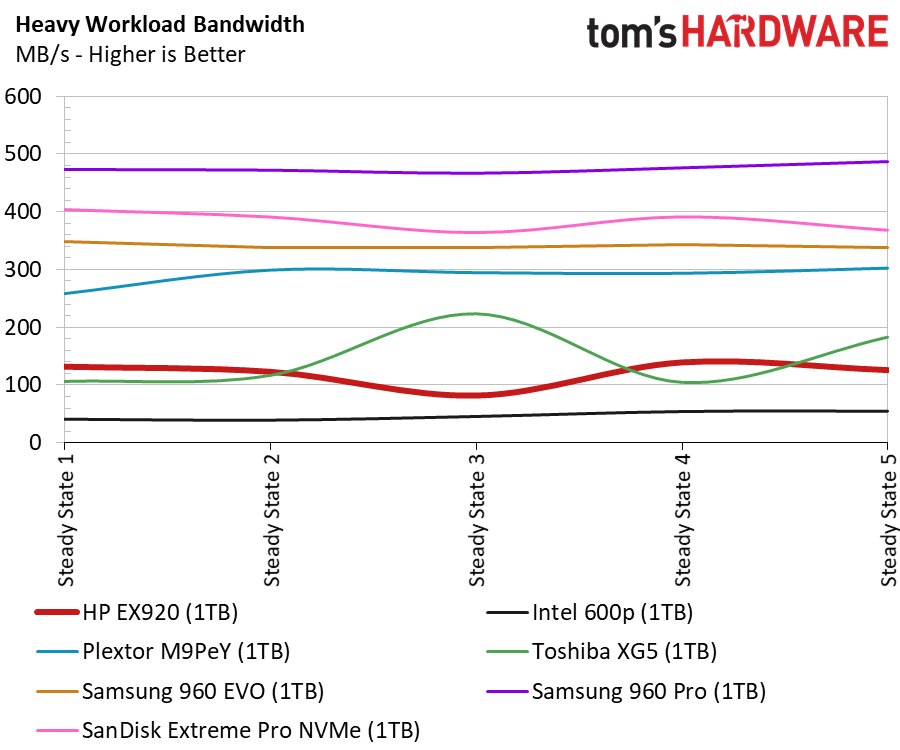
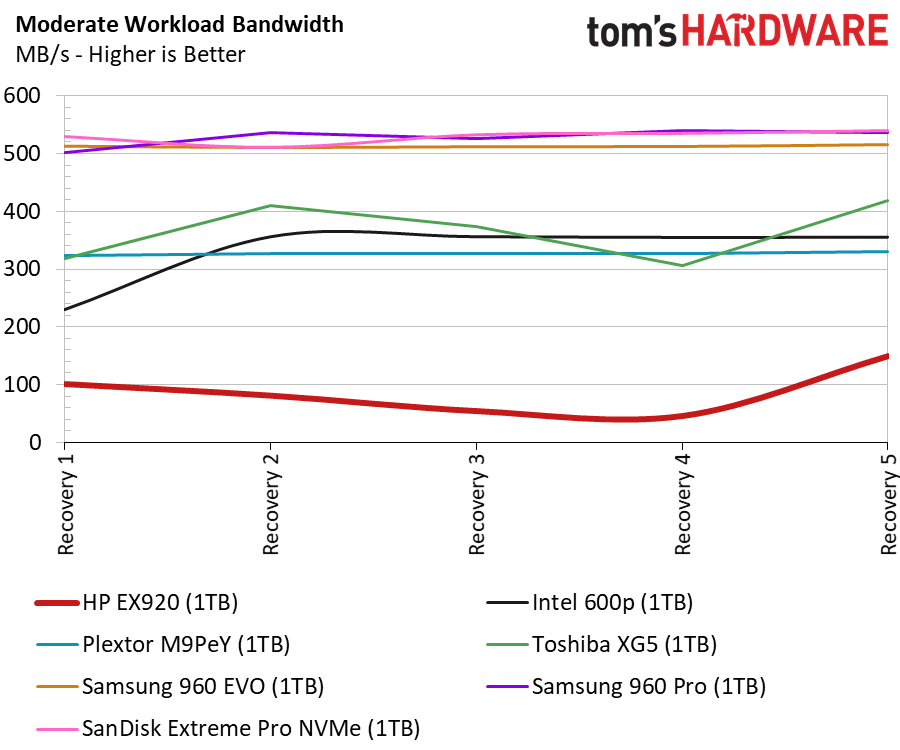
The PCMark 8 Extended Storage Test reveals that the EX920’s background activity algorithms need more work. The SM2262 is just a two-core processor, so we can't realistically expect it to compete with the five-core Samsung Pro during heavy workloads. In either case, the EX920 should recover much faster, and better, than it does.
Total Service Time
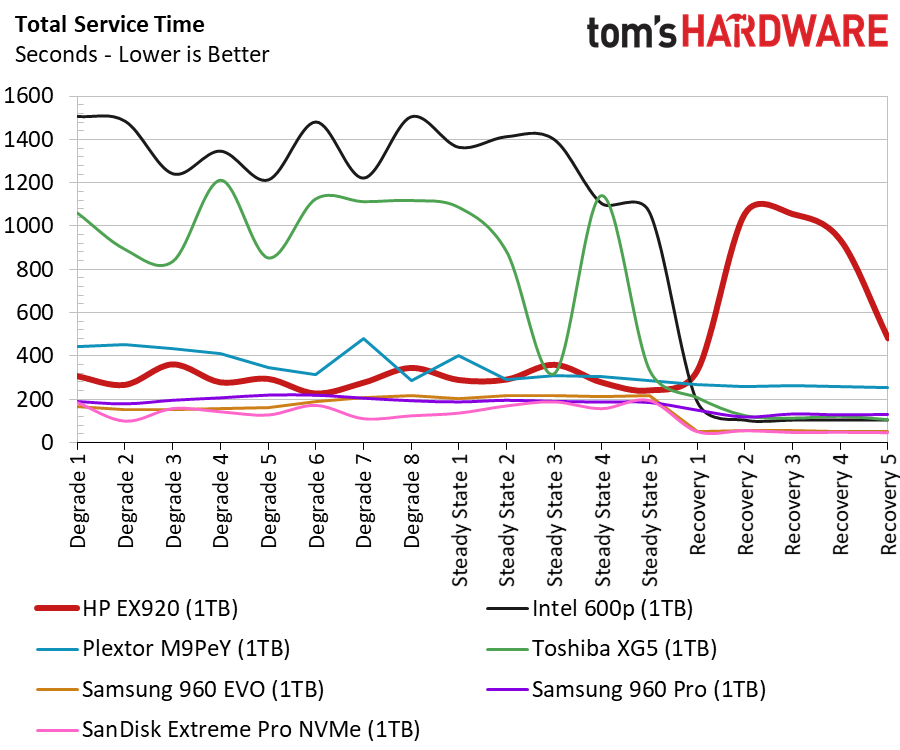
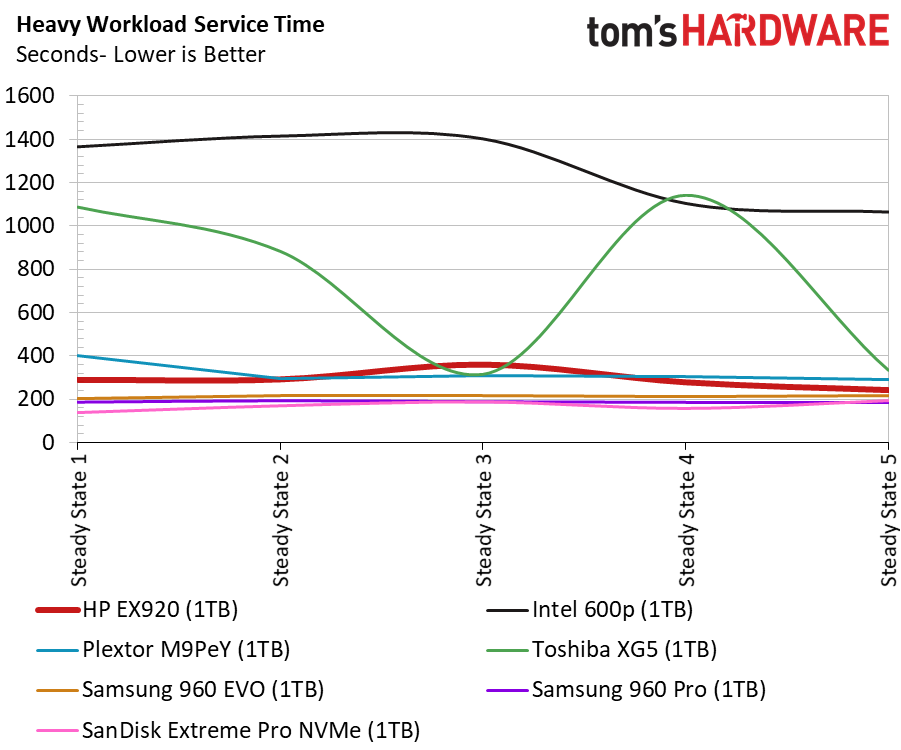
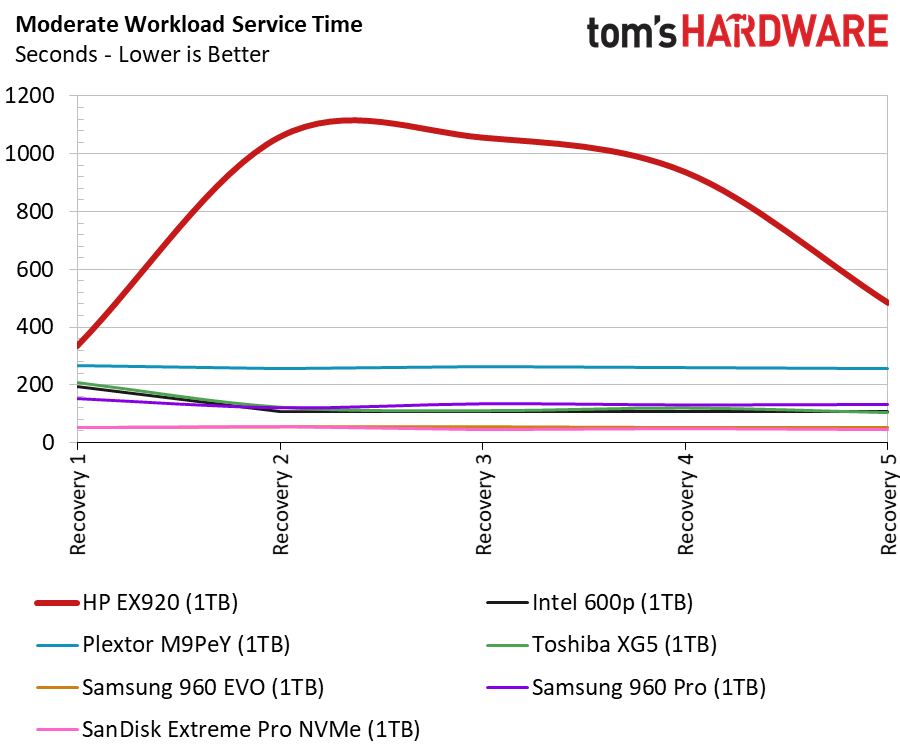
The first chart in this group shows us how the drive will begin background activities and continue to run them even when it is asked to perform other tasks. It's impossible for us to truly know what the algorithm does because companies keep the special sauce a closely guarded secret. We can make educated guesses, but the reason is less important than the results. The 1TB EX920 doesn't recover as well as other SSDs after a heavy workload.
Disk Busy Time
The degrade and steady-state portions of the test are very strenuous. Most users will never write this much data over a 24-hour period. We like to see consumer SSDs recover during the generous five-minute idle times that are interspersed between each of the recovery phases.
BAPCo SYSmark 2014 SE Responsiveness Test
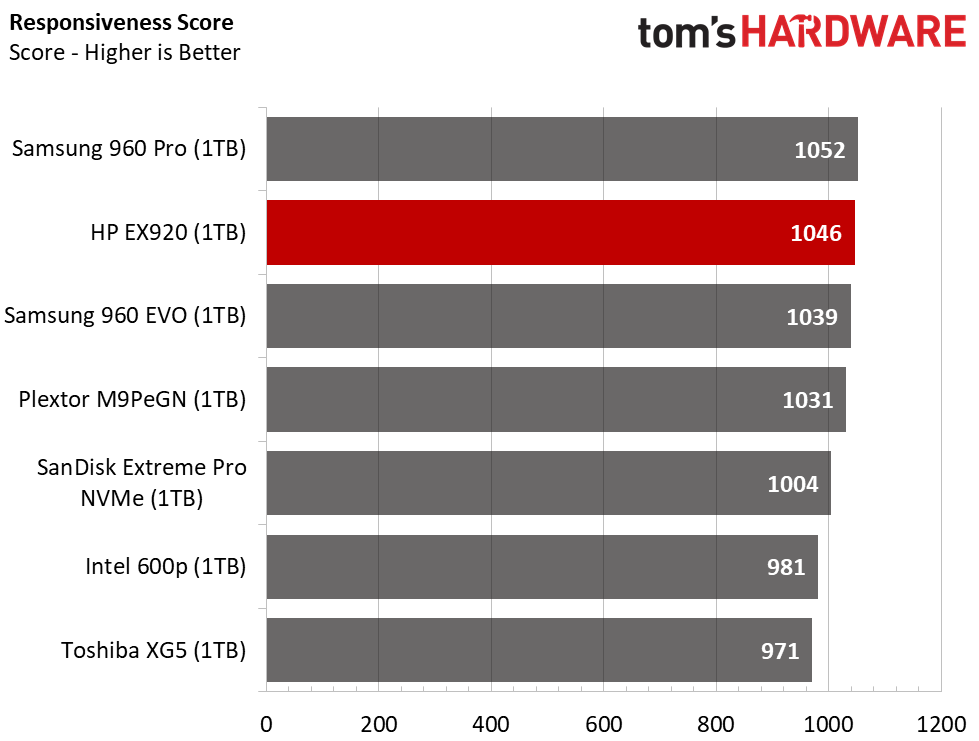
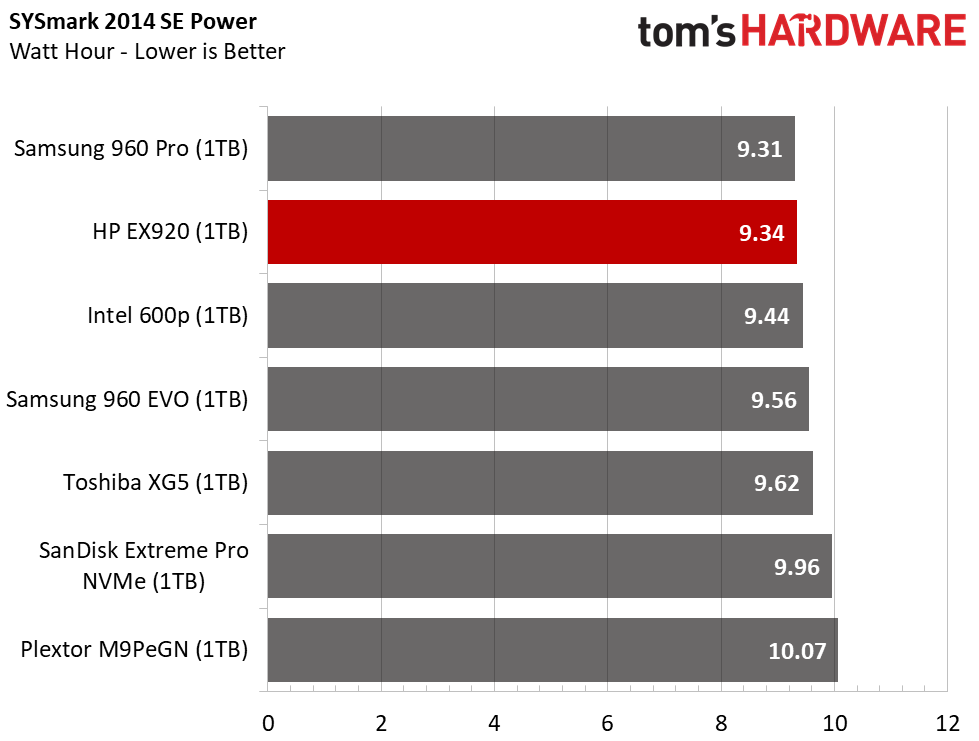
During more realistic workloads, the EX920 is the kind of product we want to see on the market: it's inexpensive and fast. We've seen several indicators that the drive is very quick, but the BAPCo SYSmark 2014 SE Responsiveness test, which uses actual applications, proves it.
The EX920 has very low latency during typical desktop workloads. The results confirm the responsive experience we found during our setup. This drive delivers a great user experience.
BAPCo MobileMark 2012.5 Notebook Battery Life
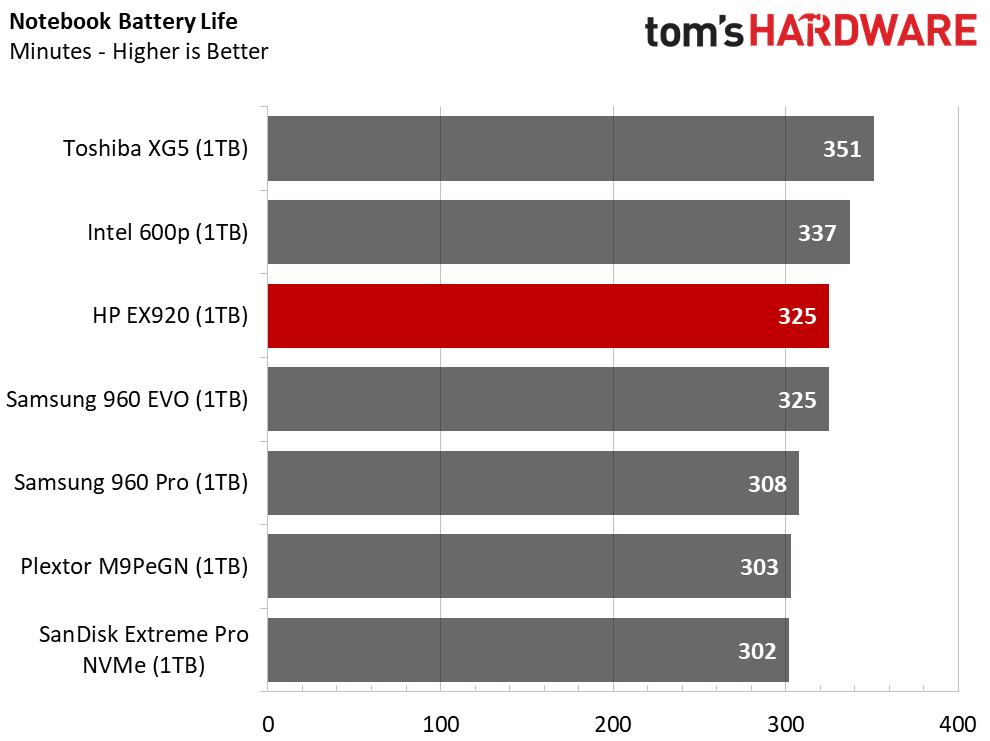
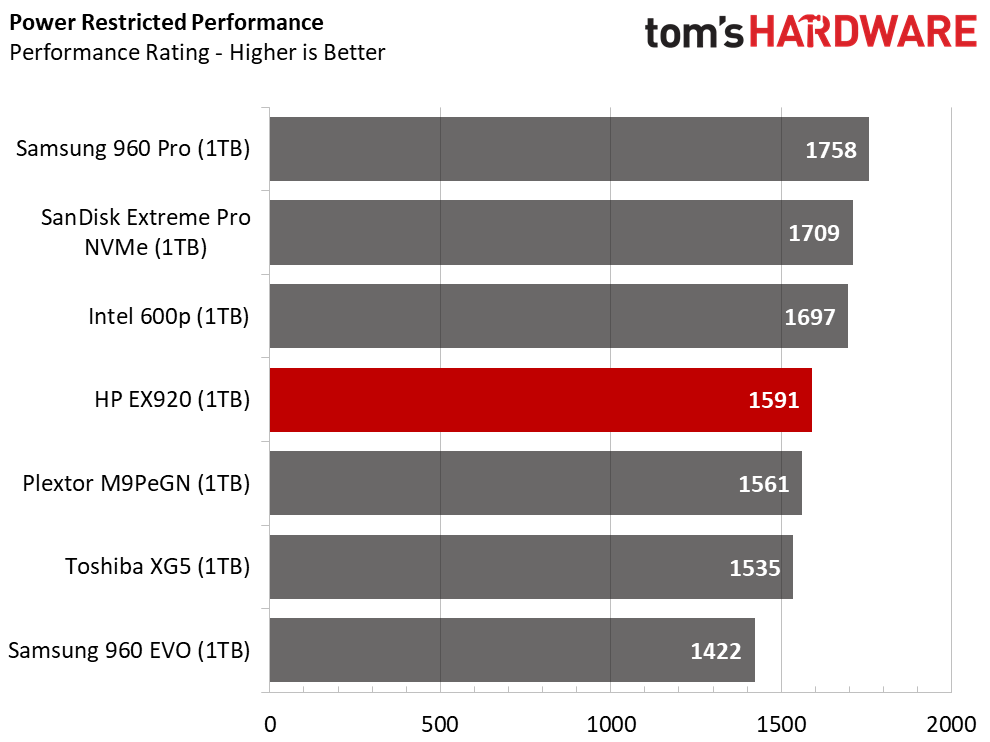
The 1TB EX920 didn't let us down in our Lenovo Y700-17 notebook battery life test, which uses BAPCo's MobileMark software. We measured 325 minutes of battery life in this system, which is the same as the 1TB 960 EVO. Notebooks slow down several system buses when they are on battery power, which restricts performance but saves power. The EX920 still delivered a solid performance score.
MORE: Best SSDs
MORE: How We Test HDDs And SSDs
MORE: All SSD Content
Current page: 1TB Performance Testing
Prev Page Features & Specifications Next Page 512GB Performance Testing
Chris Ramseyer was a senior contributing editor for Tom's Hardware. He tested and reviewed consumer storage.
-
AgentLozen They're on each capacity's respective page.Reply
For example, look at the top of this page: https://www.tomshardware.com/reviews/hp-ex920-ssd,5527-2.html -
2Be_or_Not2Be Does the retail package would come with utilities (like Samsung's Magician SSD software) or disk-cloning software?Reply -
2Be_or_Not2Be Also, the 1TB EX920 is currently on sale at Newegg for $299 USD ($50-70 less than Amazon) through 5/24.Reply -
Evolution2001 So this poses an interesting and quite timely question.Reply
I'm about to upgrade a new laptop from it's OEM 256GB to a 480/512GB NVMe PCIe drive.
Battery life matters, but it's not the only consideration.
The MyDigitalSSD BPX 480GB is currently listing for $180. But has pretty horrible impact on battery life. Almost a full 90 minutes compared to the top performers. 90 minutes is a lot when AC power is not an option.
The HP, receiving an Editors Choice, seems on par performance-wise, AND ups the ante on battery life. Selling for $200.
Overall, this would appear to dethrone the BPX 480 for "best buy". Equal performance, more storage, and better battery life.
But now Samsung throws this wrench into the mix.
Samsung.com and other reputable vendors have the Samsung 970 PRO 512GB for $250. For an additional $50 over the HP EX920, is it a no-brainer to go with the 970 PRO if you can afford it without much hesitation? I'm thinking "Yes!"
What do the rest of you think? -
AgentLozen ReplyEvolution2001 said:What do the rest of you think?
The benchmarks from the HP EX920 review show the 970 Pro as the better solid state drive (although the EX920 performs admirably). You're asking if it makes more sense to just buy a 970 Pro if its only a few dollars more. I would say stick with the less expensive EX920.
Although the benchmarks paint a favorable picture of the 970 Pro, the real world performance tests indicate that there is no appreciable difference between drives. It doesn't make sense to buy a more expensive product when you can't perceive the benefit. -
nobspls Any temperature data for these HP NVME drives? NVME gets hot in the confined spaces so this info is very important.Reply -
CRamseyer Sorry for being late to the comment party. I'm out of town but I normally try to stay on top of these.Reply
The HP uses a dual core controller that runs very cool. It's possible to push the drive to throttle but not with a typical consumer workload. Samsung uses five cores while Phison and Toshiba use quad cores, respectively.
Silicon Motion's strategy is to do more with less by building a more efficient controller. Unless you plan to beat on the drive (write a lot of data in a very short period of time) in a plastic notebook, it won't be a problem. -
Maxxify "Any temperature data for these HP NVME drives? NVME gets hot in the confined spaces so this info is very important."Reply
In my testing so far, I reached a maximum temperature of 34C while gaming (drive is in the GPU's M.2 slot), 39C while reading (100% linear read in AIDA64), and 44C with multiple operations and writing (several drives/RAIDs writing to/from it simultaneously for 30+ minutes). This is with a small BGA ramsink on the controller, though (pulled it off an old GPU memory - I use them on RPi 3s which also are quad-core ARM chips at heart). A colleague of mine who got in on the same deal as I did reported a maximum temperature of 59C and I've seen benchmarks with the same layout (controller/flash) hit 57C during testing so it's likely my heatsink is dropping temps (it does drop the RPi 3 cores up to 15C). Note that according to the SM2262's documentation the maximum/throttling temperature is 70C. 10+C overhead is acceptable but it's easy to cool these. This drive is double-sided so you cannot use the most popular heatsinks for M.2 (e.g. EK) without modification and certain motherboard ones (MSI's infamous "shield") may do more harm than good; in either case, I find that cooling of the controller (which measures roughly 16x18mm - my ramsink is 13x16 but 20x20 will suffice, using thermal tape) is sufficient. Don't worry about the cache/flash.
